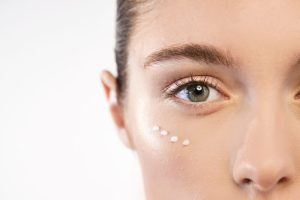Why should we not only pay attention to the ingredients when buying our skincare, but also to the composition, such as the pH value?
Quite simply! Our skin has a natural protective layer that needs to be protected. The term says it all – it’s about protecting the skin and supporting it in the best possible way. We explain what this has to do with the pH value in the following expert tip: What does the pH value have to do with our skin care?
The pH value of the skin
The skin’s natural protective barrier is based on a hydrolipid film that the skin forms via sweat and sebaceous glands. Among other things, this protects the skin from drying out and from external influences or the penetration of bacteria, viruses or other germs.
This so-called protective layer consists of water, uric acid, fatty acids and electrolytes, among other things, resulting in a certain pH value. The natural pH value of the skin is 4.7 – 5.5, which means it is in the acidic range. This value is crucial for the skin’s functions and resistance.
Consequently, this natural pH value is influenced or disturbed every time acidic or alkaline skin care products are used. Healthy skin manages to regulate this.
But why expose the skin to these challenges unnecessarily? Because they trigger complex processes in the skin.
Acids and bases, what is the right pH value for skin care
The pH value generally provides information about the balance of bases and acids. If the slightly acidic environment of the skin is changed, this also changes the natural balance.
Many manufacturers offer products on the market that are more in the alkaline range. Complementary products such as a tonic are then offered in addition to an alkaline facial cleanser. These are intended to return the skin to its natural pH value after alkaline cleansing. A strain on the skin.
But even cleansing with pure water is not necessarily positive. Normal skin can easily regulate this, but sensitive skin or dry skin will have more problems. The pH value of water is generally in the neutral range; this may vary depending on the location, but a pH value of 7 is generally recommended.
Anything above this is called alkaline, products with a low pH value are therefore considered acidic.
Water to cleanse the skin?
Of course, water is a main component of our body. There is also moisture between our skin cells, which nourishes and maintains the cells. If this moisture can escape due to a change in the skin barrier, the first fine dryness lines or openings in the skin’s otherwise closed protective layer can appear.
Bacteria or other germs can get into the skin and trigger inflammatory processes. Prolonged dehydration can also lead to the formation of unwanted deeper wrinkles. Of course, dehydration alone is not responsible for this. But it is a factor in skin ageing, as well as in changes to the skin’s appearance.
Which skin care products?
For this reason, careful attention should be paid to which products are used for skin care. A skin care product such as skinicer Repair is recommended. This corresponds to the skin’s natural pH value of 4.7 – 5.5, which supports the skin’s natural functions.
Our skin has to constantly regulate its acidic environment on a daily basis due to a variety of external influences. Additional stress from make-up and care products is not necessarily beneficial. This is especially true for sensitive and irritated skin. If this natural function is lost in problem skin, wrinkles are one of the consequences.
Other sensitivities or susceptibilities can also develop. Optimally coordinated skin care is therefore also a good anti-ageing program for the skin. An unbalanced pH value not only leads to irritation or irritation, but also to oily skin or blemished skin, for example. The cause is increased sebum production and thus clogged pores. The reason is that the pH value is too low.
The aim is therefore to use products that are specifically tailored to your own skin type and skin condition. Experts can help determine this if the skin type or condition is not known.
Another tip
The skin-like pH value of a product says little about the quality or effect of a product. It is therefore also important to take a look at the ingredients. Parabens, kerosenes or mineral oils do not belong on facial skin. Therefore, a scrutinizing look is absolutely recommended.
Did you like the article: What the pH value has to do with our skin care? You can find more skin-related topics in our expert tips. Questions can also be sent to our experts by e-mail: info@ocean-pharma.de.
Image source: Pressmaster/shutterstock.com
Experten-Tipp entstand in Zusammenarbeit mit:
Patrick Günther
Patrick Günther completed his pharmacy studies in Hamburg and, after obtaining his licence to practise, worked for several years in marketing and sales in the pharmaceutical industry. In 2003, he took over ocean pharma, the company founded by his father in Reinbek near Hamburg in 1978. Together with his business partner, he patented the important processing and standardisation process for the microalgae active ingredient Spiralin® and developed a wide range of medical cosmetics and foot care products based on Spiralin®.







